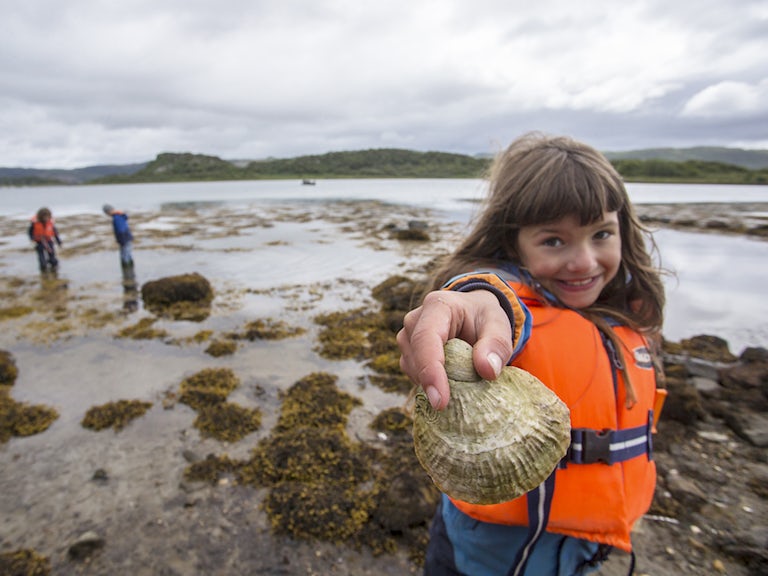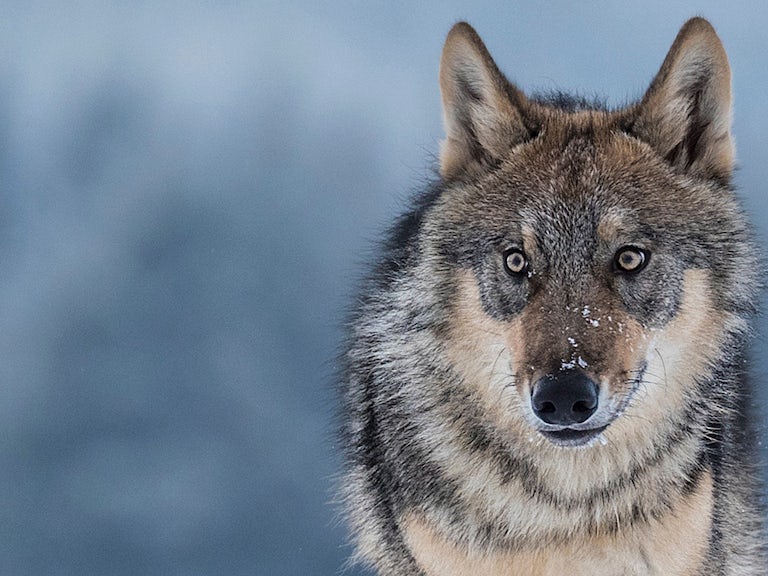Rewilding the child: of wolves and dragons
Author Gill Lewis fell under wild nature’s spell as a child, and says young people need to experience the same kind of magic or much could be lost
Published 16/07/2018
When I was a child, I poked a dragon with a stick.
I did.
I remember it even now.
It lived in a storm drain that carried floodwater from the hills onto a scrap of unkempt council land at the bottom of our steep suburban garden. I never actually saw the dragon, but its claw marks were scratched deep into the earth. Its lair was protected by an impenetrable forest of nettles, brambles and scraggly trees.
On stormy nights, I could hear the dragon’s roar. I would open my windows wide just to listen to its wild, untamed sound. It called to me. It was a world away from the monoculture lawns and neat borders of suburbia.
Whenever I could, I would scramble through the hedge at the bottom of the garden to become an explorer in this world of tangled woodland, hung with vines of ivy and crisscrossed with fox trails.
I discovered golden snakes coiled beneath piles of rubble. I crawled through daggered thickets to find the secret musician of the birdsong. I stared in fascinated horror at creepers dripping with red-jewelled berries that enticed with their poison.
The wild fed my mind
The wild beguiled me long before I knew the words for my discoveries; a legless lizard called a slow worm, a blackbird and woody nightshade berries. In this space allowed to grow wild, I was allowed to grow wild with it. It was my safe place away from the claustrophobic walls of the classroom where I struggled with reading and writing.
The wild fed my mind, my curiosity and my imagination too.
It gave me a love of the wild world.
I was enchanted by it.
Yet, sadly it was lost to the encroaching march of housing long ago. It became another small piece of the natural world erased and gone forever.
Where do the children in those houses now find their place to explore, discover and imagine?
Where are their forests?
Where are their dragons?
Nature has become something to experience on a screen, or as a tick box on a trip to a nature reserve. It is becoming something other, and separate from us.
Incentive to care
As more wild space is given over to bricks and concrete, children’s experiences of the wild world are becoming narrowed and a virtual reality. We risk future generations becoming so detached from the natural world that they will lose their love of it and have no incentive to care for it.
Love and enchantment are visceral feelings, hard wired into our brains, deeply ingrained by our experiences and memories. One of the challenges is giving children access to wild space so that they can form a connection with it.
When we think of rewilding, we often think of it on a large scale, of vast acreages and landscapes. But rewilding can occur on any scale if we allow it. It can happen in our parks and gardens and communal spaces. Small changes can have a huge impact. Instead of favouring the sterile, neat and tidy monocultures, we could allow lawns to become mini-wildflower meadows and hedges to have mixed native trees.
Ponds, log piles and bird boxes give homes for wildlife. Green space in our cities would provide essential food and refuge for many animals and create a patchwork of wild space across the urban sprawl. In doing so we would not only rewild our landscape, but also ourselves.
Allow them to be curious
In a society where children are constantly under pressure to perform for exams and are spoon-fed information, we are seeing their physical and mental health suffer. Wild space takes away those pressures. It gives children time to think, to play, to imagine and dream. It allows them to be curious. And by instilling a love of the natural world they will care deeply for it and want to protect it.
Perhaps this is the most important thing of all.
Rewilding vast landscapes may bring wolves to restore balance to the natural world.
But rewilding the child will bring dragons to help fight for it.
About the author: Gill Lewis is the author of Run Wild , published by Barrington Stoke in July 2018. This is a touching story of the bond between children and nature and celebrates our innate connection to the wild world around us. Gill worked as a vet in the UK and across the world before becoming the acclaimed author of several books for children, including Sky Hawk and Gorilla Dawn. Gill’s writing has earned her numerous awards such as the UKLA Children’s Book Award and the Little Rebel Award, and several nominations for prestigious awards including the CILIP Carnegie Medal. Gill lives in Somerset. www.gilllewis.com. Twitter: @Gill_Lewis

Explore our Rewilding Manifesto
We need UK Government to Think Big and Act Wild for nature, people and planet.
Learn more
Our vision
We have big ambitions. Find out what we’ve set out to achieve through rewilding.
Our 2025-2030 strategy



